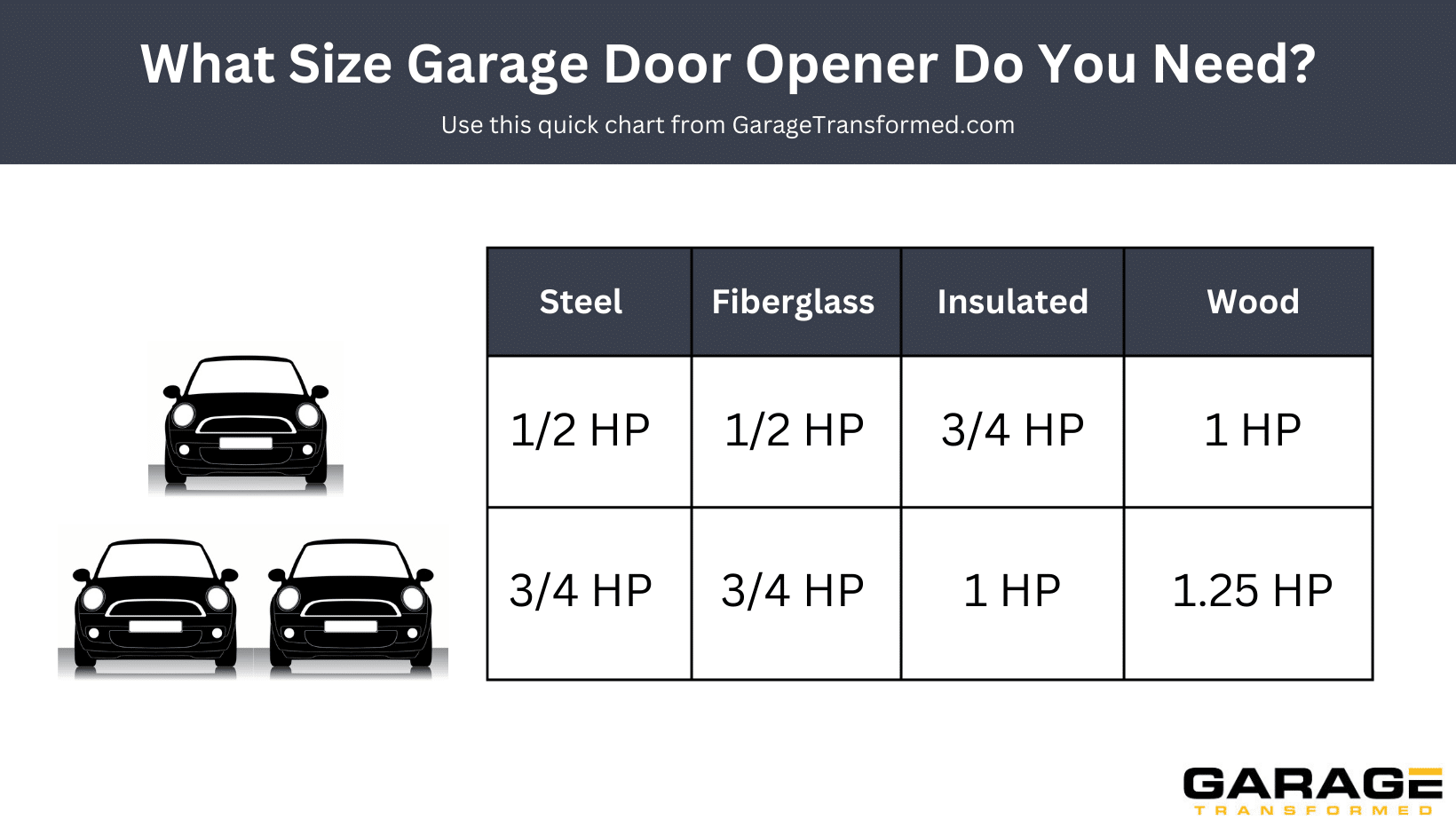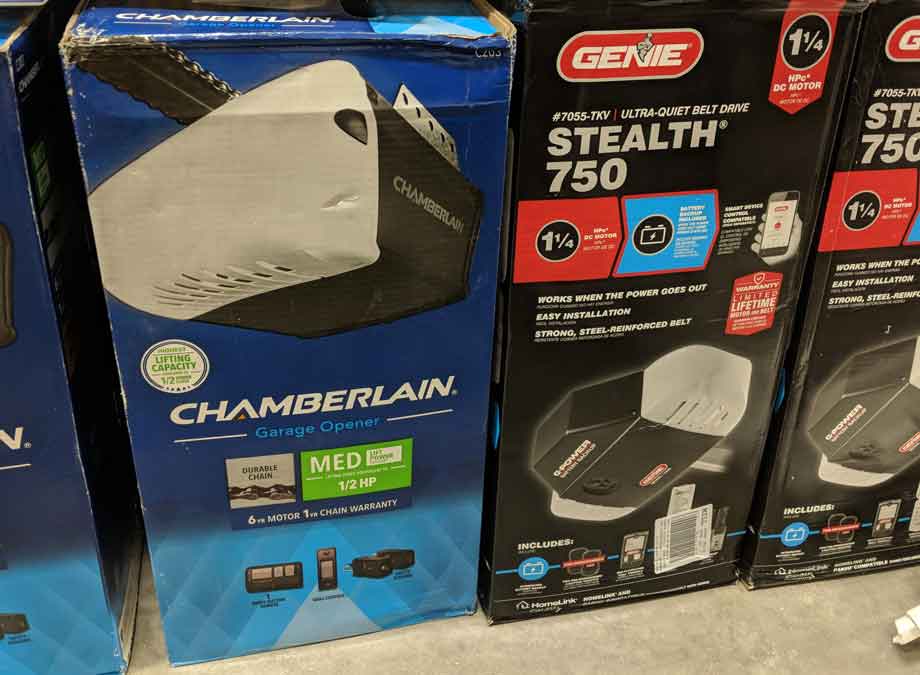The last time I bought a garage door opener, I only shopped based on how much horsepower it had.
I mean…more is better, right?
Maybe for cars, but not for your garage door opener.
So I ended up spending more money than I needed to.
How much horsepower do garage door openers need? One-car garages with steel doors only need a 1/2 horsepower garage door opener. Two-car garages or one-car garages with insulated or wooden doors need at least a 3/4 horsepower garage door opener. Garages with carriage doors require 1 HP garage door openers or higher.
Horsepower should only be the starting point when shopping for garage door openers. Manufacturers often hold back important safety and convenience features for higher horsepower models. We’ll get into some of those later on.
Hopefully, by the end of this article, you’ll know enough to avoid making the same mistake I did, buying a garage door opener based solely on how much horsepower it has.
What Size Garage Door Opener Do I Need?
The more your garage door weighs, the more horsepower you need to open and close it.
Which makes sense when you think about it.
We’ll get more into how much garage doors weigh in the next section, but it will depend greatly on the size of the door and what material it’s made of.
I created a simple chart so you can quickly tell how much garage door opener horsepower you need.
It starts with a 1/2 HP garage door opener, which is the minimum horsepower you should look at.
If you have a one-car garage, use the column on the left. If you have a two-car garage, use the column on the right. Once you know what material your garage door is made of, simply go down to that row and use the HP value in the corresponding box.
For example, if you have a two-car garage door made of fiberglass, you would need to purchase a 3/4 HP door opener.

How Much Is a Garage Door Opener [By Horsepower]?
1/3 HP ($?): Before I bought my last new garage door opener, I found a few articles that suggested a 1/3 HP as the entry-level. The problem is that most garage door opener manufacturers stopped making a 1/3 Horsepower door opener. You may still be able to find old stock lying around, but I’d steer clear of these.
1/2 HP ($150-$230): This price point is the new entry-level garage door opener with very few bells and whistles. The major selling point at this level is the number of remotes they include. You’ll also get an exterior keypad entry on some more expensive models. If you’re looking at a garage door opener over $200, I’d move to the 3/4 HP models instead.
3/4 HP ($180-$300): You’ll see more exciting features like smart home integrations or smartphone apps. The more expensive models will include a battery backup or an LCD wall console.
1.25 HP and up ($250+): This is the cream of the crop. Every opener I found with over 1 1/4 HP had an external keypad included, smartphone integration, and most of them had a battery backup. You’ll also find some really cool innovations, like automatic locking.
Why Don’t DC Garage Door Openers List Horsepower?
So, you might have noticed that some garage door openers with DC motors list their power in terms of Newtons (N) instead of horsepower.
You’re probably more familiar with horsepower, but let’s demystify this Newton thing for you.
Think of a Newton like this: it’s the amount of ‘oomph’ you’d need to get a kilogram of anything moving at a speed of one meter per second, and keep it moving at that speed.
So if you see a garage door opener with a power listed as 800-900N, that means it’s got the same power as something with about ½ – ¾ horsepower.
Why does this matter?
When you’re comparing garage door openers, you want to compare like for like.
So, if you’re considering a DC motor, you can look at the Newton rating and think of it as you would horsepower in an AC motor.
This way, you can find the best garage door opener that fits your needs, regardless of whether it’s measured in horsepower or Newtons.
It’s all about picking the right tool for the job, right?
Why Your Garage Door Size & Weight Matter
As we’ve seen, how much your garage door weighs is the biggest factor in how much horsepower you need in your garage door opener.
Wooden garage doors, insulated garage doors, or doors with windows will weigh more than your basic steel door.
Generally, a single-car steel garage door is about 8′ x 7′ and weighs roughly 80-90 pounds. Although adding garage door insulation will push that to between 100-110 pounds on average. Changing to a wooden door or adding windows will increase the weight to over 130 lbs.
A double garage door is usually 16′ x 8′ and weighs between 150 and 210 pounds. Going with windows or a wooden garage door here and the total weight balloons up to almost 350 pounds.
Is Garage Door Opener Horsepower as Important as You Think?
Horsepower gets our attention, and garage door opener manufacturers know it.
Most people don’t really care about smartphone integration or extra safety features like automatic locking.
Don’t get me wrong. They’re nice innovations, but they won’t get me to run out and buy a new garage door opener based on that alone.
Imagine walking through Lowe’s or Home Depot and seeing a new garage door opener with 1 1/4 HP.
Your old one has a measly 1/2 HP.
On some level, you start thinking that more garage door opener horsepower will make the opener more efficient and open your garage door faster.
Then you’re hooked.
YOU MUST HAVE IT!!!

But that’s wrong.
That extra 3/4 HP doesn’t open my garage door any faster, and it’s not the motor that does most of the work.
Another thing that won’t matter is whether or not you have a high-lift garage door. Whether you have a standard track or high-lift track, that won’t change what size garage door opener you need.
So if garage door opener horsepower isn’t that important…then what is it good for?
More Horsepower = More Features
Manufacturers know that people (men especially) buy more horsepower because they think it’s automatically better.
To really make their products stand out, they’ll need to decide to add some new features as well: things like extra remotes, smart-home integrations, or safety features.
That’s what we should be focusing on instead of HP.
So using horsepower as a guide, let’s look at what else is included in those models first. Then we’ll talk about how much horsepower you really need to lift your garage door.
5 Garage Door Openers Features More Important Than Horsepower
OK…so higher garage door opener horsepower is a marketing gimmick.
What should you look for instead? Here are five of my suggestions:
Mobile App
Have you ever left home and wondered if you forgot to close the garage door? Wouldn’t it be great if you could open and close your garage door from your smartphone?
More and more companies are jumping on that bandwagon and offering mobile integration with their higher-end models.
Smart Home Integration
Similarly, integrating your garage door opener with other features of your smart home has benefits.
Imagine your door opening automatically as you pull into the driveway or integrating with your Google Assistant or Alexa to open or close the door remotely from anywhere in your house?
Battery backup
If you lose power in your home, you don’t want your car stuck inside the house. In some states, like California, battery backups are required for all garage door openers by law. Still, a battery backup is a great safety feature, even if it’s not required.
I made sure that my elderly mother had a battery backup for her garage door opener because she can’t lift the garage door by herself. Now I don’t have to worry that she’ll be stuck inside the house in case of an emergency.
Auto-close for safety
Have you ever forgotten to close the garage door at night? Some garage door openers will automatically close after a specific time so that your family and belongings are safe.
Wall mountable
I mentioned this one earlier. Some garage door openers mount on the wall next to the door, removing that ugly center rail down the middle of your garage. That gives you more space for overhead storage or even a ceiling fan to help cool down your garage.
How Important is the Torsion Spring?
The more the door weighs, the more garage door opener horsepower you need. Easy right?
Not so fast.
Horsepower isn’t everything.
Believe it or not, the garage door opener doesn’t do most of the work. The torsion spring does the heavy lifting – literally.
With a properly balanced garage door, the torsion spring and garage door opener work together to raise and lower the door easily.
If the spring isn’t calibrated correctly (too tight\too loose\wrong size\etc.), or you have an unbalanced door, the entire system will suffer.
You’ll also want to keep your garage door properly clean and lubricated. For a quick guide, check out this article I wrote about how to spend five minutes once a year to lubricate your garage door.
Think about how the opener actually pulls the garage door up and down.
Chain drive and belt drive garage door openers are the most common – and least expensive. Chain drive garage door openers are usually cheaper than belt drive units but much louder.
There are a couple of other innovative options as well.
Sommer makes Direct Drive garage door openers that move along the track while it’s working.
Because the unit is moving, not the chain, there should be almost no noise. This type of garage door opener is a little pricey, so I’d like to see this one in person to better understand how it sounds.
The one I’ve got my eyes on for my garage renovation is the Liftmaster 8500W, one of the new Jackshaft garage door openers. The design is common in commercial applications but less so in residential homes.
Instead of being on a track hanging over the center of your garage, it is mounted directly to the wall next to your door. Just imagine what you can do with all of that extra space!
Wrapping It Up
Choosing a new garage door opener seems like an easy decision. Horsepower should be the guiding factor, right?
But as we’ve uncovered, there’s so much more beneath the surface.
Garage door opener horsepower shouldn’t be the only factor in your buying decision. Instead, factor in the weight and material of your garage door and any “must-have” features you want.
As we’ve seen, higher horsepower doesn’t necessarily mean faster or better performance. Instead, it often means more features. Some of which you may genuinely need, and others might just be bells and whistles.
Hopefully, this helps you choose the right new garage door opener.
I know it did for me.
